Moral Dilemma Analysis Report
VerifiedAdded on 2023/03/23
|12
|3161
|48
AI Summary
This report evaluates the implementation of AI by insurance companies in the healthcare industry and discusses its impact on society.
Contribute Materials
Your contribution can guide someone’s learning journey. Share your
documents today.
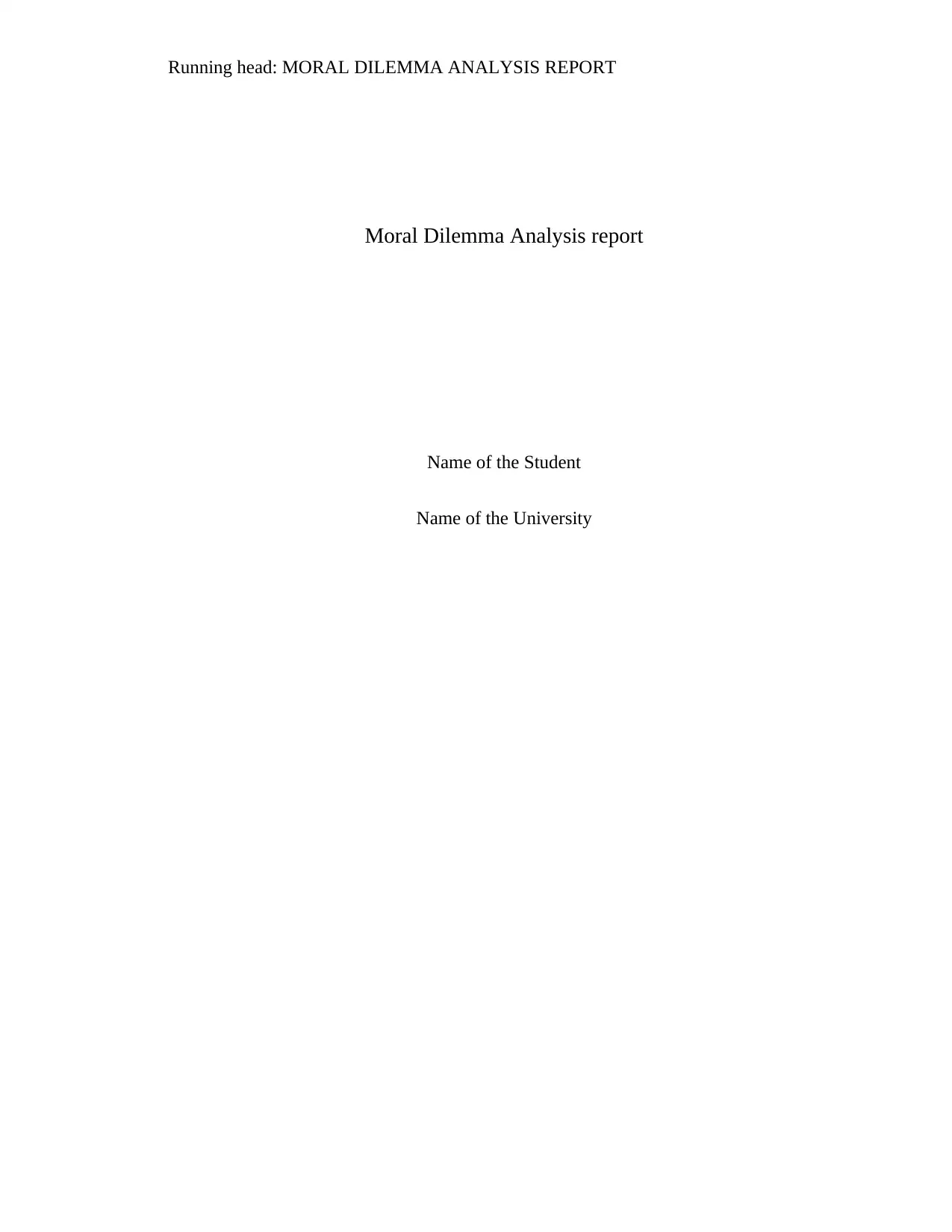
Running head: MORAL DILEMMA ANALYSIS REPORT
Moral Dilemma Analysis report
Name of the Student
Name of the University
Moral Dilemma Analysis report
Name of the Student
Name of the University
Secure Best Marks with AI Grader
Need help grading? Try our AI Grader for instant feedback on your assignments.
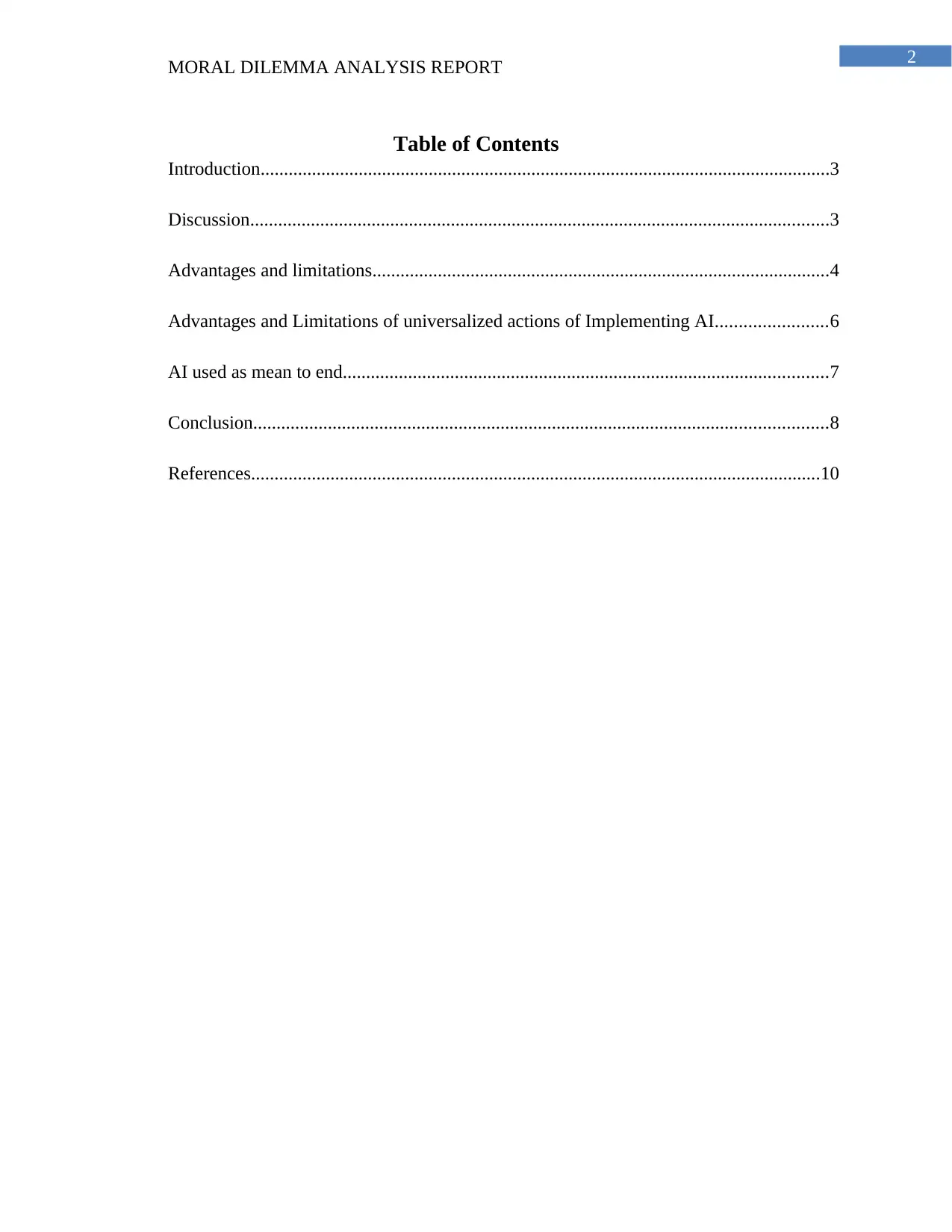
2
MORAL DILEMMA ANALYSIS REPORT
Table of Contents
Introduction..........................................................................................................................3
Discussion............................................................................................................................3
Advantages and limitations..................................................................................................4
Advantages and Limitations of universalized actions of Implementing AI........................6
AI used as mean to end........................................................................................................7
Conclusion...........................................................................................................................8
References..........................................................................................................................10
MORAL DILEMMA ANALYSIS REPORT
Table of Contents
Introduction..........................................................................................................................3
Discussion............................................................................................................................3
Advantages and limitations..................................................................................................4
Advantages and Limitations of universalized actions of Implementing AI........................6
AI used as mean to end........................................................................................................7
Conclusion...........................................................................................................................8
References..........................................................................................................................10
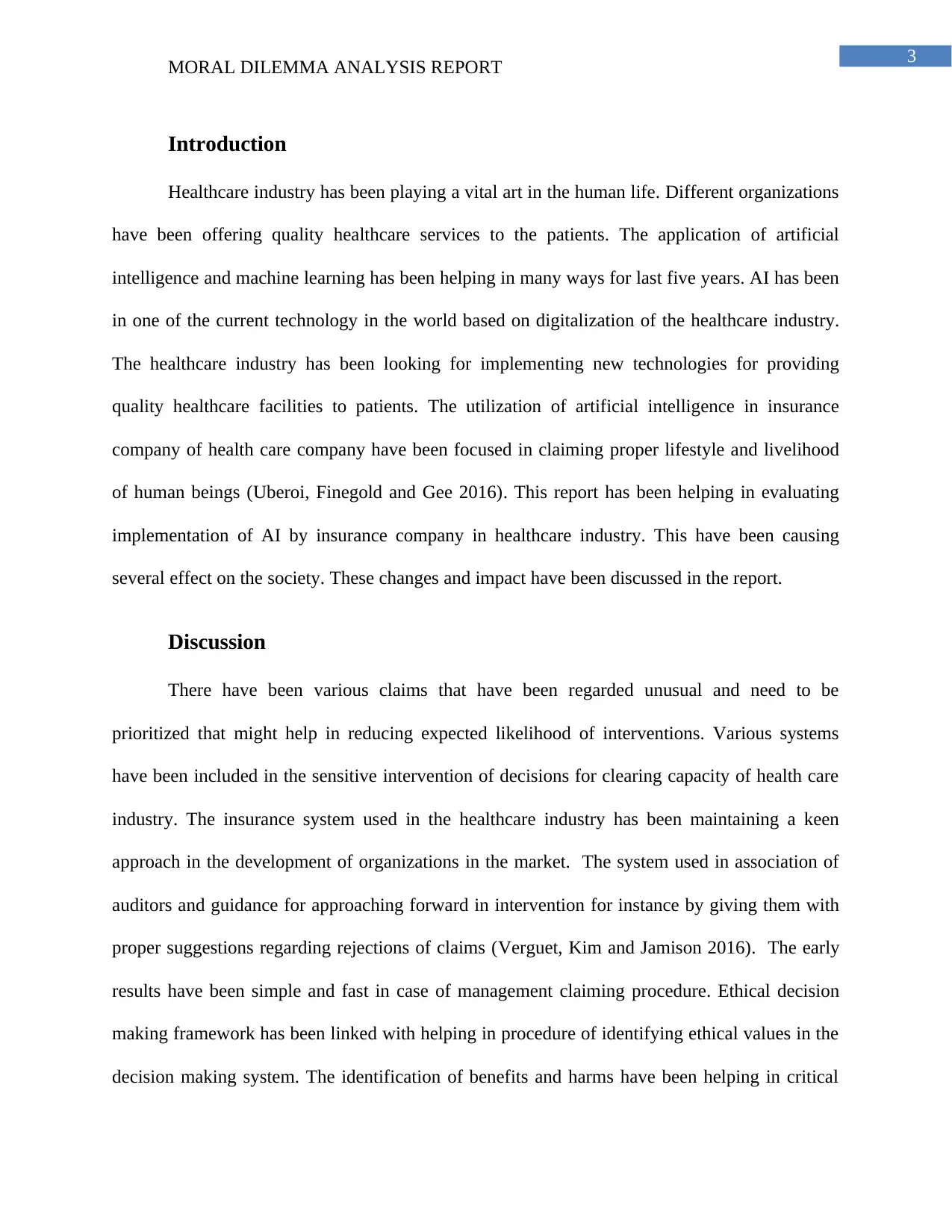
3
MORAL DILEMMA ANALYSIS REPORT
Introduction
Healthcare industry has been playing a vital art in the human life. Different organizations
have been offering quality healthcare services to the patients. The application of artificial
intelligence and machine learning has been helping in many ways for last five years. AI has been
in one of the current technology in the world based on digitalization of the healthcare industry.
The healthcare industry has been looking for implementing new technologies for providing
quality healthcare facilities to patients. The utilization of artificial intelligence in insurance
company of health care company have been focused in claiming proper lifestyle and livelihood
of human beings (Uberoi, Finegold and Gee 2016). This report has been helping in evaluating
implementation of AI by insurance company in healthcare industry. This have been causing
several effect on the society. These changes and impact have been discussed in the report.
Discussion
There have been various claims that have been regarded unusual and need to be
prioritized that might help in reducing expected likelihood of interventions. Various systems
have been included in the sensitive intervention of decisions for clearing capacity of health care
industry. The insurance system used in the healthcare industry has been maintaining a keen
approach in the development of organizations in the market. The system used in association of
auditors and guidance for approaching forward in intervention for instance by giving them with
proper suggestions regarding rejections of claims (Verguet, Kim and Jamison 2016). The early
results have been simple and fast in case of management claiming procedure. Ethical decision
making framework has been linked with helping in procedure of identifying ethical values in the
decision making system. The identification of benefits and harms have been helping in critical
MORAL DILEMMA ANALYSIS REPORT
Introduction
Healthcare industry has been playing a vital art in the human life. Different organizations
have been offering quality healthcare services to the patients. The application of artificial
intelligence and machine learning has been helping in many ways for last five years. AI has been
in one of the current technology in the world based on digitalization of the healthcare industry.
The healthcare industry has been looking for implementing new technologies for providing
quality healthcare facilities to patients. The utilization of artificial intelligence in insurance
company of health care company have been focused in claiming proper lifestyle and livelihood
of human beings (Uberoi, Finegold and Gee 2016). This report has been helping in evaluating
implementation of AI by insurance company in healthcare industry. This have been causing
several effect on the society. These changes and impact have been discussed in the report.
Discussion
There have been various claims that have been regarded unusual and need to be
prioritized that might help in reducing expected likelihood of interventions. Various systems
have been included in the sensitive intervention of decisions for clearing capacity of health care
industry. The insurance system used in the healthcare industry has been maintaining a keen
approach in the development of organizations in the market. The system used in association of
auditors and guidance for approaching forward in intervention for instance by giving them with
proper suggestions regarding rejections of claims (Verguet, Kim and Jamison 2016). The early
results have been simple and fast in case of management claiming procedure. Ethical decision
making framework has been linked with helping in procedure of identifying ethical values in the
decision making system. The identification of benefits and harms have been helping in critical
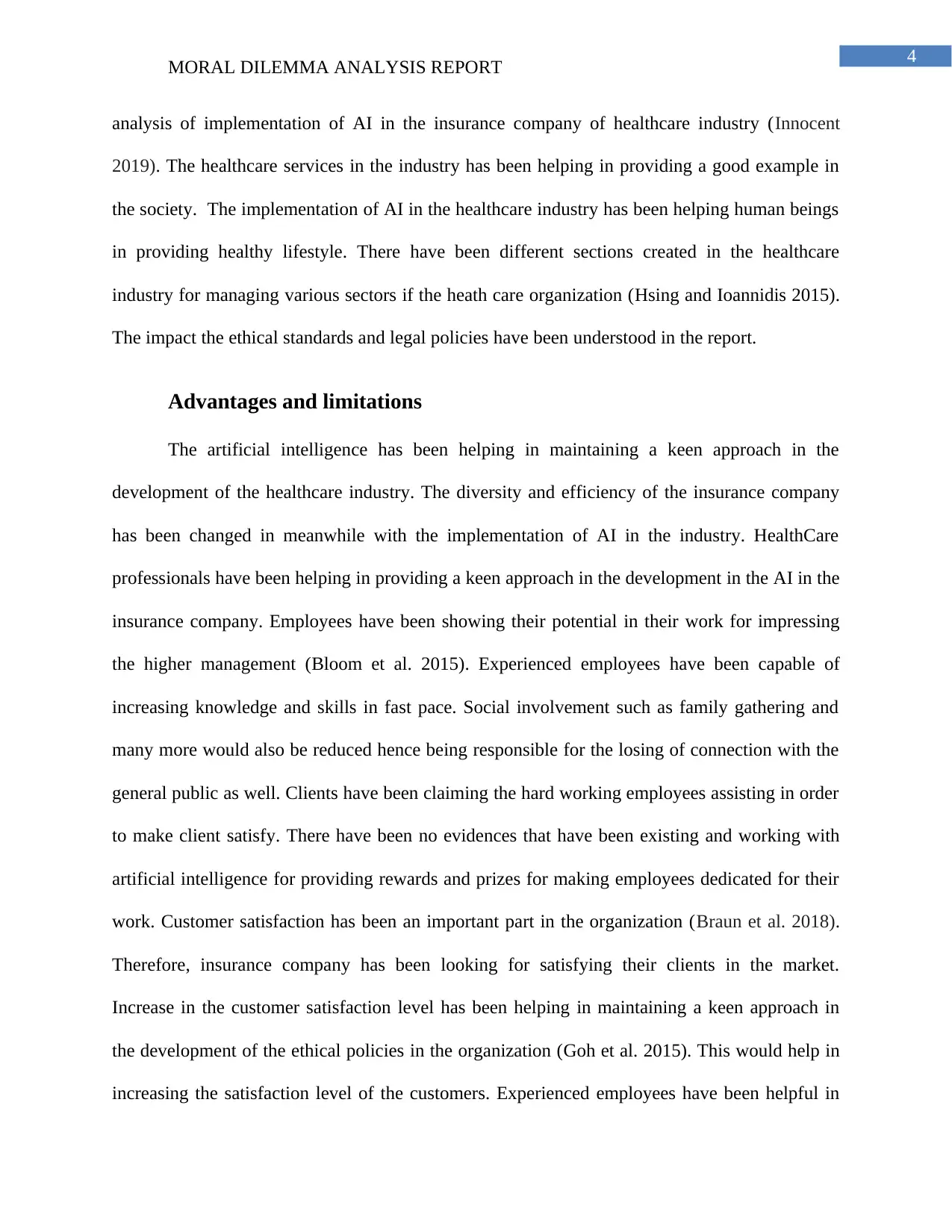
4
MORAL DILEMMA ANALYSIS REPORT
analysis of implementation of AI in the insurance company of healthcare industry (Innocent
2019). The healthcare services in the industry has been helping in providing a good example in
the society. The implementation of AI in the healthcare industry has been helping human beings
in providing healthy lifestyle. There have been different sections created in the healthcare
industry for managing various sectors if the heath care organization (Hsing and Ioannidis 2015).
The impact the ethical standards and legal policies have been understood in the report.
Advantages and limitations
The artificial intelligence has been helping in maintaining a keen approach in the
development of the healthcare industry. The diversity and efficiency of the insurance company
has been changed in meanwhile with the implementation of AI in the industry. HealthCare
professionals have been helping in providing a keen approach in the development in the AI in the
insurance company. Employees have been showing their potential in their work for impressing
the higher management (Bloom et al. 2015). Experienced employees have been capable of
increasing knowledge and skills in fast pace. Social involvement such as family gathering and
many more would also be reduced hence being responsible for the losing of connection with the
general public as well. Clients have been claiming the hard working employees assisting in order
to make client satisfy. There have been no evidences that have been existing and working with
artificial intelligence for providing rewards and prizes for making employees dedicated for their
work. Customer satisfaction has been an important part in the organization (Braun et al. 2018).
Therefore, insurance company has been looking for satisfying their clients in the market.
Increase in the customer satisfaction level has been helping in maintaining a keen approach in
the development of the ethical policies in the organization (Goh et al. 2015). This would help in
increasing the satisfaction level of the customers. Experienced employees have been helpful in
MORAL DILEMMA ANALYSIS REPORT
analysis of implementation of AI in the insurance company of healthcare industry (Innocent
2019). The healthcare services in the industry has been helping in providing a good example in
the society. The implementation of AI in the healthcare industry has been helping human beings
in providing healthy lifestyle. There have been different sections created in the healthcare
industry for managing various sectors if the heath care organization (Hsing and Ioannidis 2015).
The impact the ethical standards and legal policies have been understood in the report.
Advantages and limitations
The artificial intelligence has been helping in maintaining a keen approach in the
development of the healthcare industry. The diversity and efficiency of the insurance company
has been changed in meanwhile with the implementation of AI in the industry. HealthCare
professionals have been helping in providing a keen approach in the development in the AI in the
insurance company. Employees have been showing their potential in their work for impressing
the higher management (Bloom et al. 2015). Experienced employees have been capable of
increasing knowledge and skills in fast pace. Social involvement such as family gathering and
many more would also be reduced hence being responsible for the losing of connection with the
general public as well. Clients have been claiming the hard working employees assisting in order
to make client satisfy. There have been no evidences that have been existing and working with
artificial intelligence for providing rewards and prizes for making employees dedicated for their
work. Customer satisfaction has been an important part in the organization (Braun et al. 2018).
Therefore, insurance company has been looking for satisfying their clients in the market.
Increase in the customer satisfaction level has been helping in maintaining a keen approach in
the development of the ethical policies in the organization (Goh et al. 2015). This would help in
increasing the satisfaction level of the customers. Experienced employees have been helpful in
Secure Best Marks with AI Grader
Need help grading? Try our AI Grader for instant feedback on your assignments.
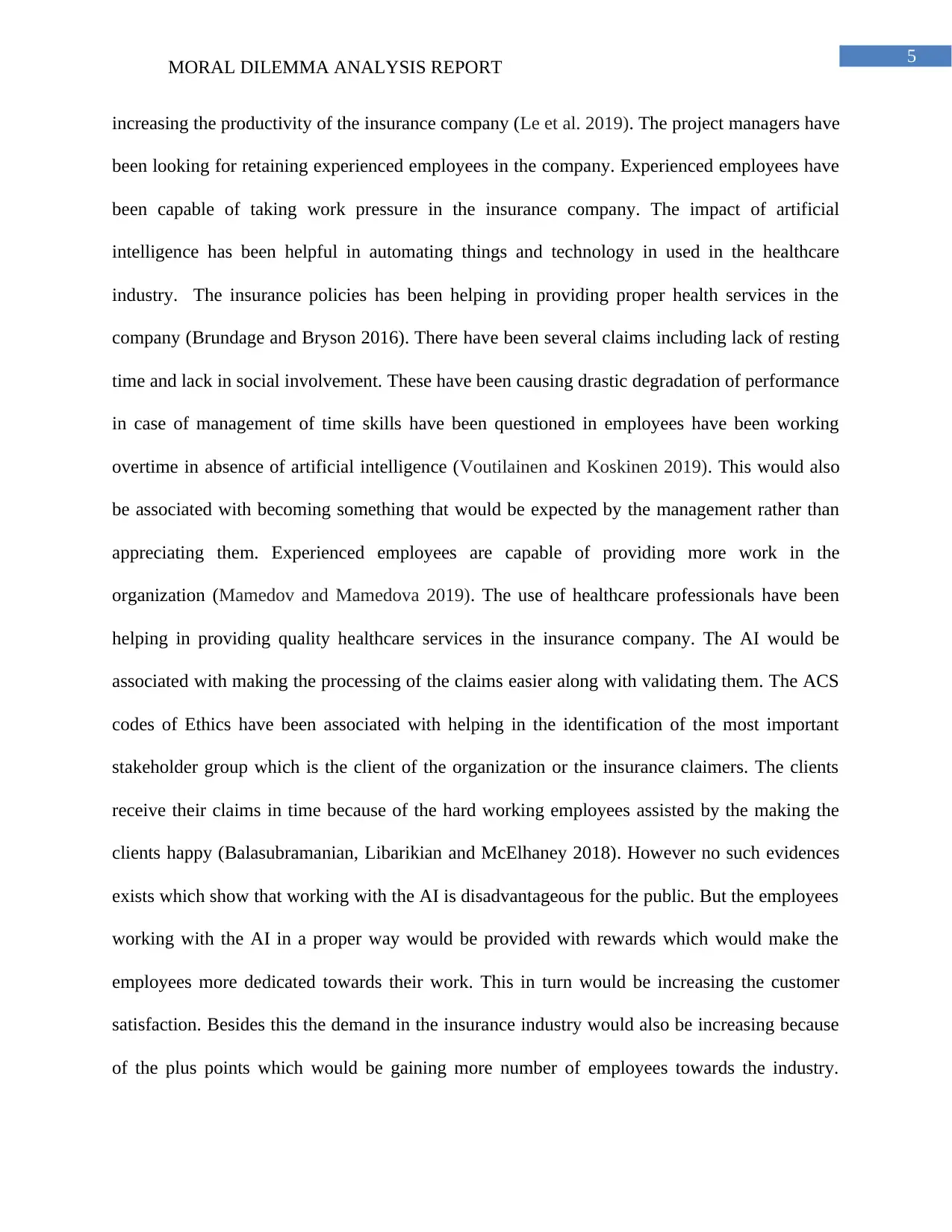
5
MORAL DILEMMA ANALYSIS REPORT
increasing the productivity of the insurance company (Le et al. 2019). The project managers have
been looking for retaining experienced employees in the company. Experienced employees have
been capable of taking work pressure in the insurance company. The impact of artificial
intelligence has been helpful in automating things and technology in used in the healthcare
industry. The insurance policies has been helping in providing proper health services in the
company (Brundage and Bryson 2016). There have been several claims including lack of resting
time and lack in social involvement. These have been causing drastic degradation of performance
in case of management of time skills have been questioned in employees have been working
overtime in absence of artificial intelligence (Voutilainen and Koskinen 2019). This would also
be associated with becoming something that would be expected by the management rather than
appreciating them. Experienced employees are capable of providing more work in the
organization (Mamedov and Mamedova 2019). The use of healthcare professionals have been
helping in providing quality healthcare services in the insurance company. The AI would be
associated with making the processing of the claims easier along with validating them. The ACS
codes of Ethics have been associated with helping in the identification of the most important
stakeholder group which is the client of the organization or the insurance claimers. The clients
receive their claims in time because of the hard working employees assisted by the making the
clients happy (Balasubramanian, Libarikian and McElhaney 2018). However no such evidences
exists which show that working with the AI is disadvantageous for the public. But the employees
working with the AI in a proper way would be provided with rewards which would make the
employees more dedicated towards their work. This in turn would be increasing the customer
satisfaction. Besides this the demand in the insurance industry would also be increasing because
of the plus points which would be gaining more number of employees towards the industry.
MORAL DILEMMA ANALYSIS REPORT
increasing the productivity of the insurance company (Le et al. 2019). The project managers have
been looking for retaining experienced employees in the company. Experienced employees have
been capable of taking work pressure in the insurance company. The impact of artificial
intelligence has been helpful in automating things and technology in used in the healthcare
industry. The insurance policies has been helping in providing proper health services in the
company (Brundage and Bryson 2016). There have been several claims including lack of resting
time and lack in social involvement. These have been causing drastic degradation of performance
in case of management of time skills have been questioned in employees have been working
overtime in absence of artificial intelligence (Voutilainen and Koskinen 2019). This would also
be associated with becoming something that would be expected by the management rather than
appreciating them. Experienced employees are capable of providing more work in the
organization (Mamedov and Mamedova 2019). The use of healthcare professionals have been
helping in providing quality healthcare services in the insurance company. The AI would be
associated with making the processing of the claims easier along with validating them. The ACS
codes of Ethics have been associated with helping in the identification of the most important
stakeholder group which is the client of the organization or the insurance claimers. The clients
receive their claims in time because of the hard working employees assisted by the making the
clients happy (Balasubramanian, Libarikian and McElhaney 2018). However no such evidences
exists which show that working with the AI is disadvantageous for the public. But the employees
working with the AI in a proper way would be provided with rewards which would make the
employees more dedicated towards their work. This in turn would be increasing the customer
satisfaction. Besides this the demand in the insurance industry would also be increasing because
of the plus points which would be gaining more number of employees towards the industry.
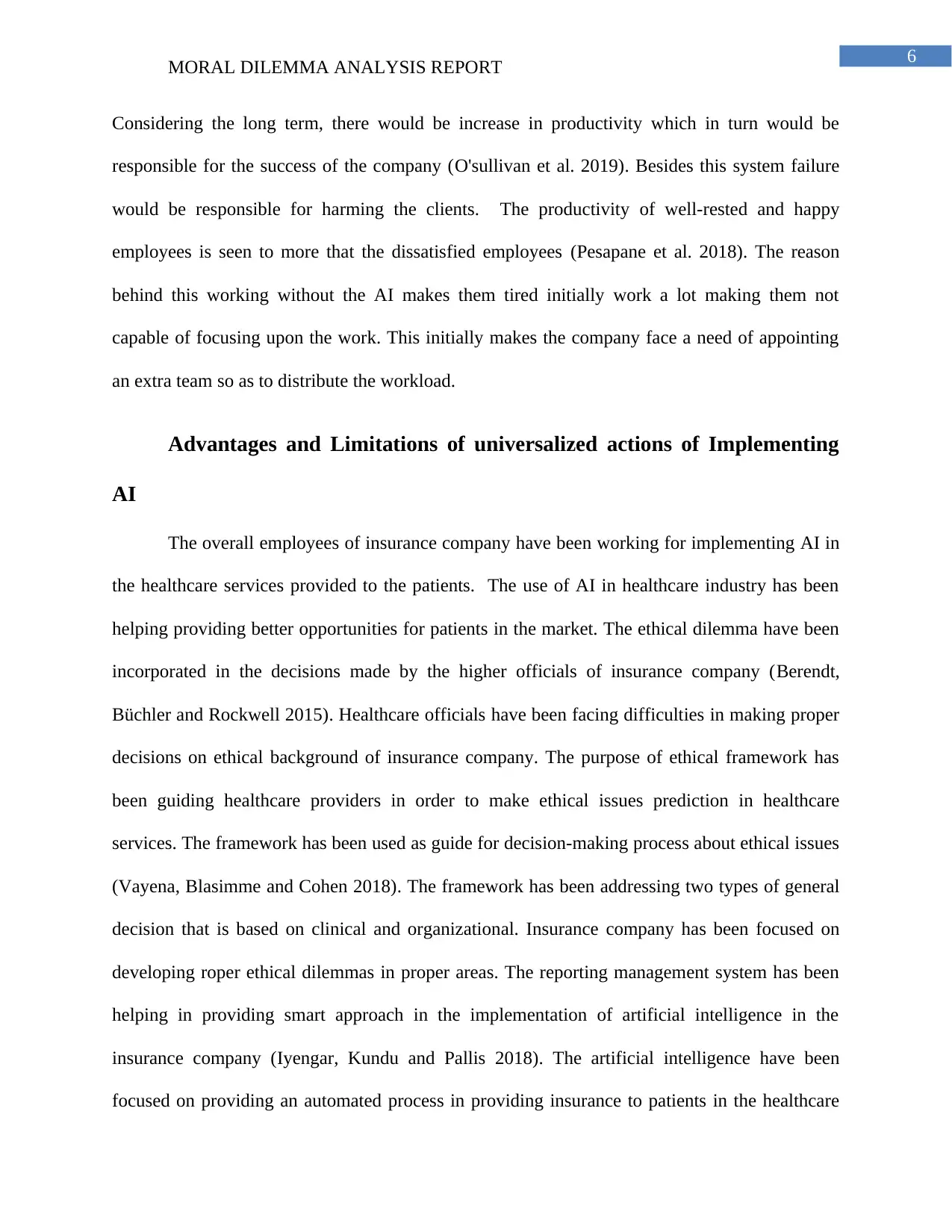
6
MORAL DILEMMA ANALYSIS REPORT
Considering the long term, there would be increase in productivity which in turn would be
responsible for the success of the company (O'sullivan et al. 2019). Besides this system failure
would be responsible for harming the clients. The productivity of well-rested and happy
employees is seen to more that the dissatisfied employees (Pesapane et al. 2018). The reason
behind this working without the AI makes them tired initially work a lot making them not
capable of focusing upon the work. This initially makes the company face a need of appointing
an extra team so as to distribute the workload.
Advantages and Limitations of universalized actions of Implementing
AI
The overall employees of insurance company have been working for implementing AI in
the healthcare services provided to the patients. The use of AI in healthcare industry has been
helping providing better opportunities for patients in the market. The ethical dilemma have been
incorporated in the decisions made by the higher officials of insurance company (Berendt,
Büchler and Rockwell 2015). Healthcare officials have been facing difficulties in making proper
decisions on ethical background of insurance company. The purpose of ethical framework has
been guiding healthcare providers in order to make ethical issues prediction in healthcare
services. The framework has been used as guide for decision-making process about ethical issues
(Vayena, Blasimme and Cohen 2018). The framework has been addressing two types of general
decision that is based on clinical and organizational. Insurance company has been focused on
developing roper ethical dilemmas in proper areas. The reporting management system has been
helping in providing smart approach in the implementation of artificial intelligence in the
insurance company (Iyengar, Kundu and Pallis 2018). The artificial intelligence have been
focused on providing an automated process in providing insurance to patients in the healthcare
MORAL DILEMMA ANALYSIS REPORT
Considering the long term, there would be increase in productivity which in turn would be
responsible for the success of the company (O'sullivan et al. 2019). Besides this system failure
would be responsible for harming the clients. The productivity of well-rested and happy
employees is seen to more that the dissatisfied employees (Pesapane et al. 2018). The reason
behind this working without the AI makes them tired initially work a lot making them not
capable of focusing upon the work. This initially makes the company face a need of appointing
an extra team so as to distribute the workload.
Advantages and Limitations of universalized actions of Implementing
AI
The overall employees of insurance company have been working for implementing AI in
the healthcare services provided to the patients. The use of AI in healthcare industry has been
helping providing better opportunities for patients in the market. The ethical dilemma have been
incorporated in the decisions made by the higher officials of insurance company (Berendt,
Büchler and Rockwell 2015). Healthcare officials have been facing difficulties in making proper
decisions on ethical background of insurance company. The purpose of ethical framework has
been guiding healthcare providers in order to make ethical issues prediction in healthcare
services. The framework has been used as guide for decision-making process about ethical issues
(Vayena, Blasimme and Cohen 2018). The framework has been addressing two types of general
decision that is based on clinical and organizational. Insurance company has been focused on
developing roper ethical dilemmas in proper areas. The reporting management system has been
helping in providing smart approach in the implementation of artificial intelligence in the
insurance company (Iyengar, Kundu and Pallis 2018). The artificial intelligence have been
focused on providing an automated process in providing insurance to patients in the healthcare
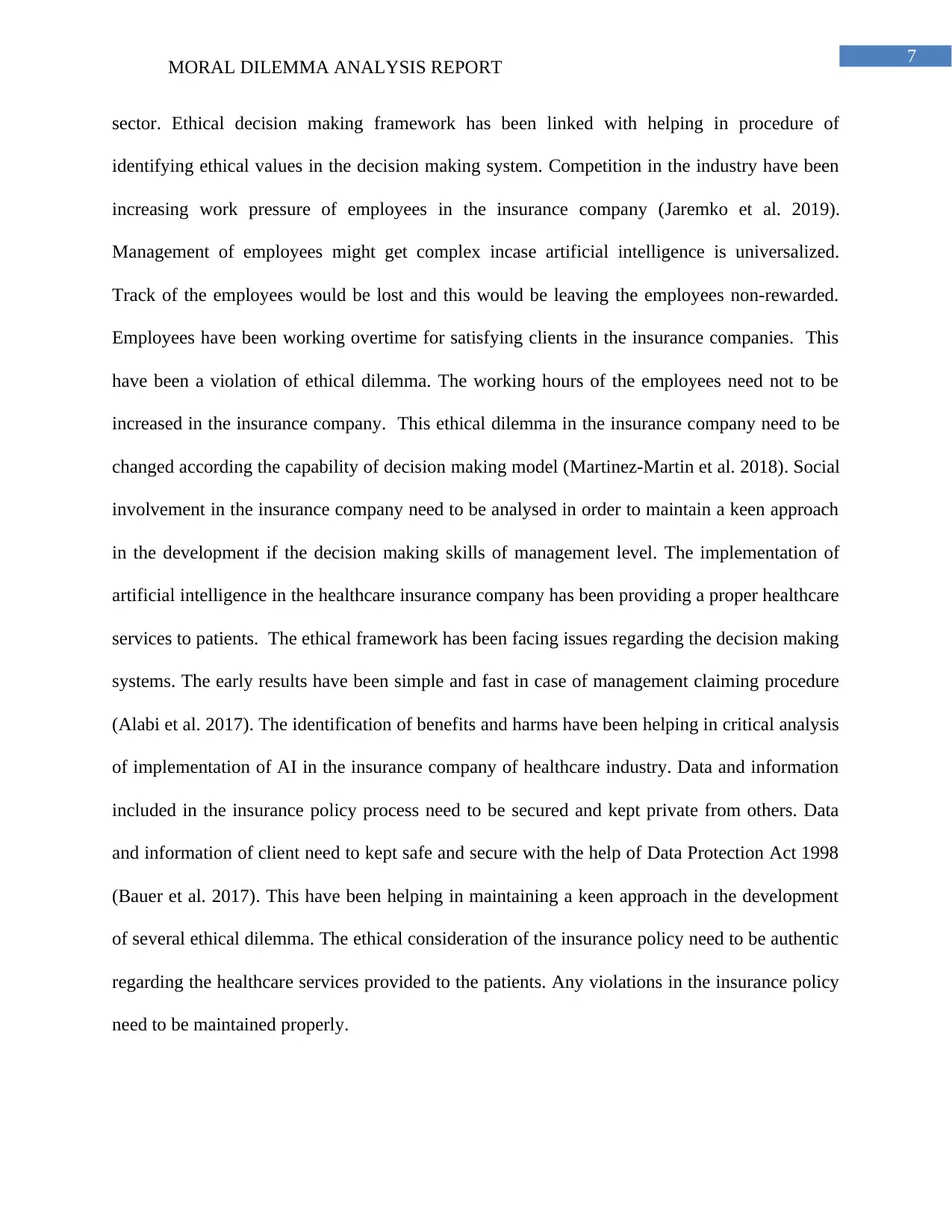
7
MORAL DILEMMA ANALYSIS REPORT
sector. Ethical decision making framework has been linked with helping in procedure of
identifying ethical values in the decision making system. Competition in the industry have been
increasing work pressure of employees in the insurance company (Jaremko et al. 2019).
Management of employees might get complex incase artificial intelligence is universalized.
Track of the employees would be lost and this would be leaving the employees non-rewarded.
Employees have been working overtime for satisfying clients in the insurance companies. This
have been a violation of ethical dilemma. The working hours of the employees need not to be
increased in the insurance company. This ethical dilemma in the insurance company need to be
changed according the capability of decision making model (Martinez-Martin et al. 2018). Social
involvement in the insurance company need to be analysed in order to maintain a keen approach
in the development if the decision making skills of management level. The implementation of
artificial intelligence in the healthcare insurance company has been providing a proper healthcare
services to patients. The ethical framework has been facing issues regarding the decision making
systems. The early results have been simple and fast in case of management claiming procedure
(Alabi et al. 2017). The identification of benefits and harms have been helping in critical analysis
of implementation of AI in the insurance company of healthcare industry. Data and information
included in the insurance policy process need to be secured and kept private from others. Data
and information of client need to kept safe and secure with the help of Data Protection Act 1998
(Bauer et al. 2017). This have been helping in maintaining a keen approach in the development
of several ethical dilemma. The ethical consideration of the insurance policy need to be authentic
regarding the healthcare services provided to the patients. Any violations in the insurance policy
need to be maintained properly.
MORAL DILEMMA ANALYSIS REPORT
sector. Ethical decision making framework has been linked with helping in procedure of
identifying ethical values in the decision making system. Competition in the industry have been
increasing work pressure of employees in the insurance company (Jaremko et al. 2019).
Management of employees might get complex incase artificial intelligence is universalized.
Track of the employees would be lost and this would be leaving the employees non-rewarded.
Employees have been working overtime for satisfying clients in the insurance companies. This
have been a violation of ethical dilemma. The working hours of the employees need not to be
increased in the insurance company. This ethical dilemma in the insurance company need to be
changed according the capability of decision making model (Martinez-Martin et al. 2018). Social
involvement in the insurance company need to be analysed in order to maintain a keen approach
in the development if the decision making skills of management level. The implementation of
artificial intelligence in the healthcare insurance company has been providing a proper healthcare
services to patients. The ethical framework has been facing issues regarding the decision making
systems. The early results have been simple and fast in case of management claiming procedure
(Alabi et al. 2017). The identification of benefits and harms have been helping in critical analysis
of implementation of AI in the insurance company of healthcare industry. Data and information
included in the insurance policy process need to be secured and kept private from others. Data
and information of client need to kept safe and secure with the help of Data Protection Act 1998
(Bauer et al. 2017). This have been helping in maintaining a keen approach in the development
of several ethical dilemma. The ethical consideration of the insurance policy need to be authentic
regarding the healthcare services provided to the patients. Any violations in the insurance policy
need to be maintained properly.
Paraphrase This Document
Need a fresh take? Get an instant paraphrase of this document with our AI Paraphraser
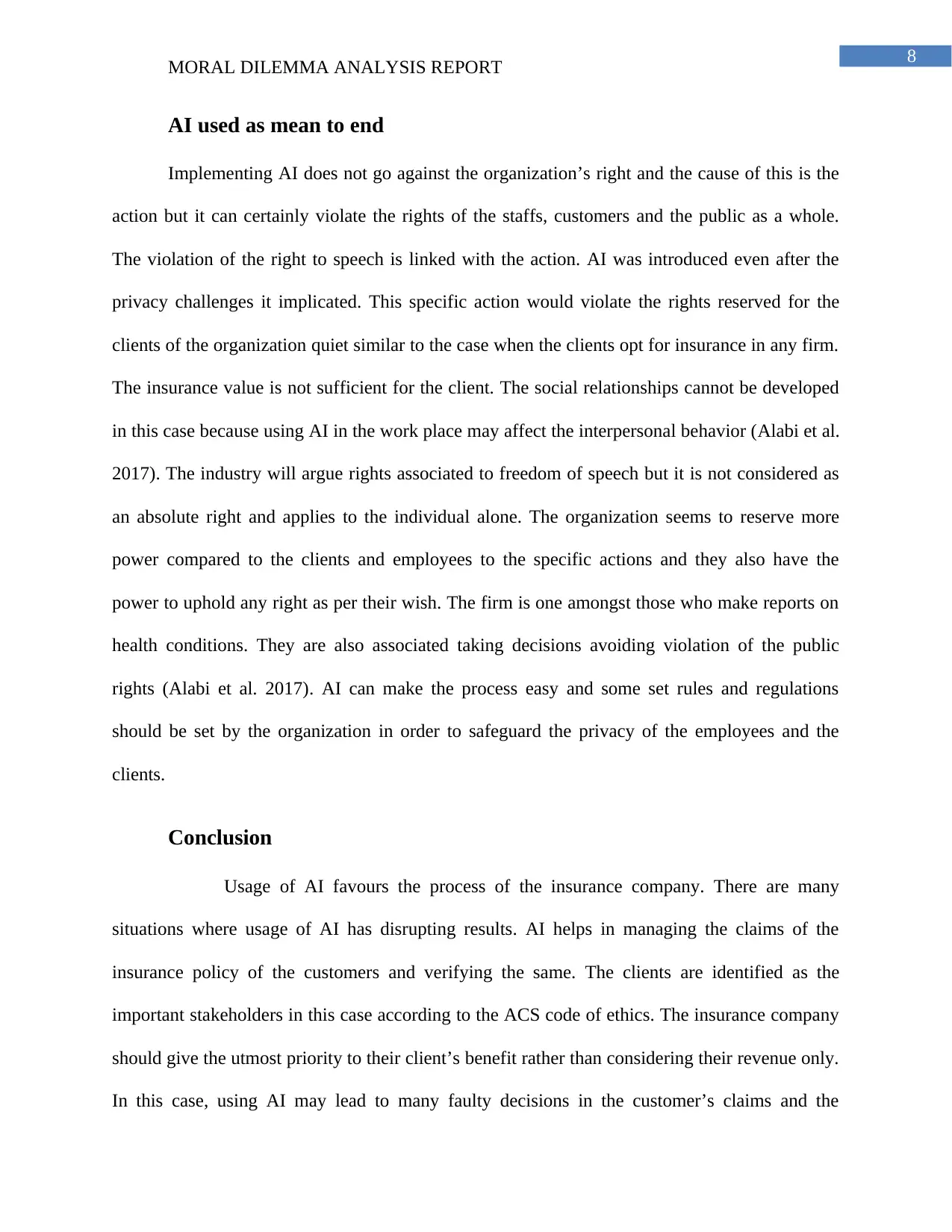
8
MORAL DILEMMA ANALYSIS REPORT
AI used as mean to end
Implementing AI does not go against the organization’s right and the cause of this is the
action but it can certainly violate the rights of the staffs, customers and the public as a whole.
The violation of the right to speech is linked with the action. AI was introduced even after the
privacy challenges it implicated. This specific action would violate the rights reserved for the
clients of the organization quiet similar to the case when the clients opt for insurance in any firm.
The insurance value is not sufficient for the client. The social relationships cannot be developed
in this case because using AI in the work place may affect the interpersonal behavior (Alabi et al.
2017). The industry will argue rights associated to freedom of speech but it is not considered as
an absolute right and applies to the individual alone. The organization seems to reserve more
power compared to the clients and employees to the specific actions and they also have the
power to uphold any right as per their wish. The firm is one amongst those who make reports on
health conditions. They are also associated taking decisions avoiding violation of the public
rights (Alabi et al. 2017). AI can make the process easy and some set rules and regulations
should be set by the organization in order to safeguard the privacy of the employees and the
clients.
Conclusion
Usage of AI favours the process of the insurance company. There are many
situations where usage of AI has disrupting results. AI helps in managing the claims of the
insurance policy of the customers and verifying the same. The clients are identified as the
important stakeholders in this case according to the ACS code of ethics. The insurance company
should give the utmost priority to their client’s benefit rather than considering their revenue only.
In this case, using AI may lead to many faulty decisions in the customer’s claims and the
MORAL DILEMMA ANALYSIS REPORT
AI used as mean to end
Implementing AI does not go against the organization’s right and the cause of this is the
action but it can certainly violate the rights of the staffs, customers and the public as a whole.
The violation of the right to speech is linked with the action. AI was introduced even after the
privacy challenges it implicated. This specific action would violate the rights reserved for the
clients of the organization quiet similar to the case when the clients opt for insurance in any firm.
The insurance value is not sufficient for the client. The social relationships cannot be developed
in this case because using AI in the work place may affect the interpersonal behavior (Alabi et al.
2017). The industry will argue rights associated to freedom of speech but it is not considered as
an absolute right and applies to the individual alone. The organization seems to reserve more
power compared to the clients and employees to the specific actions and they also have the
power to uphold any right as per their wish. The firm is one amongst those who make reports on
health conditions. They are also associated taking decisions avoiding violation of the public
rights (Alabi et al. 2017). AI can make the process easy and some set rules and regulations
should be set by the organization in order to safeguard the privacy of the employees and the
clients.
Conclusion
Usage of AI favours the process of the insurance company. There are many
situations where usage of AI has disrupting results. AI helps in managing the claims of the
insurance policy of the customers and verifying the same. The clients are identified as the
important stakeholders in this case according to the ACS code of ethics. The insurance company
should give the utmost priority to their client’s benefit rather than considering their revenue only.
In this case, using AI may lead to many faulty decisions in the customer’s claims and the
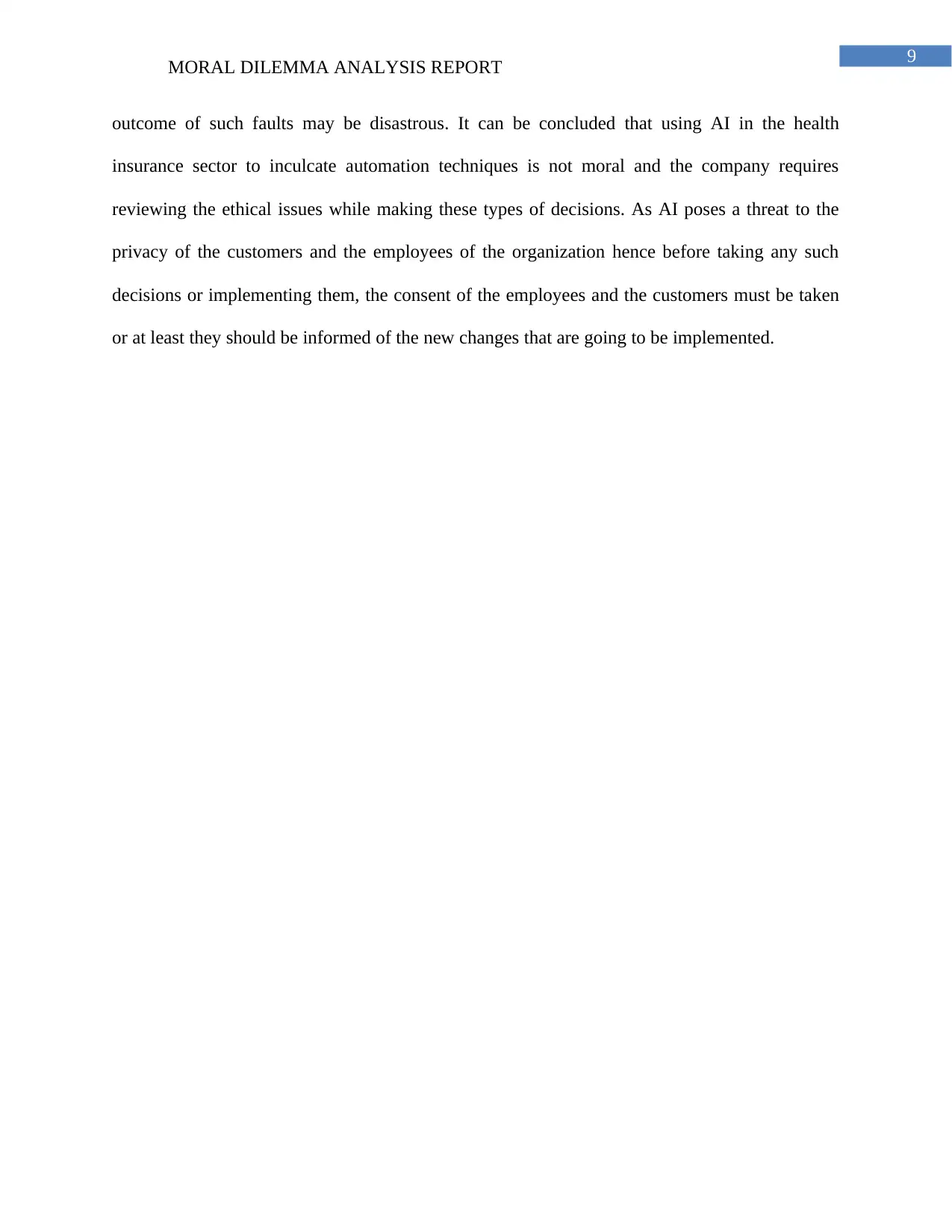
9
MORAL DILEMMA ANALYSIS REPORT
outcome of such faults may be disastrous. It can be concluded that using AI in the health
insurance sector to inculcate automation techniques is not moral and the company requires
reviewing the ethical issues while making these types of decisions. As AI poses a threat to the
privacy of the customers and the employees of the organization hence before taking any such
decisions or implementing them, the consent of the employees and the customers must be taken
or at least they should be informed of the new changes that are going to be implemented.
MORAL DILEMMA ANALYSIS REPORT
outcome of such faults may be disastrous. It can be concluded that using AI in the health
insurance sector to inculcate automation techniques is not moral and the company requires
reviewing the ethical issues while making these types of decisions. As AI poses a threat to the
privacy of the customers and the employees of the organization hence before taking any such
decisions or implementing them, the consent of the employees and the customers must be taken
or at least they should be informed of the new changes that are going to be implemented.
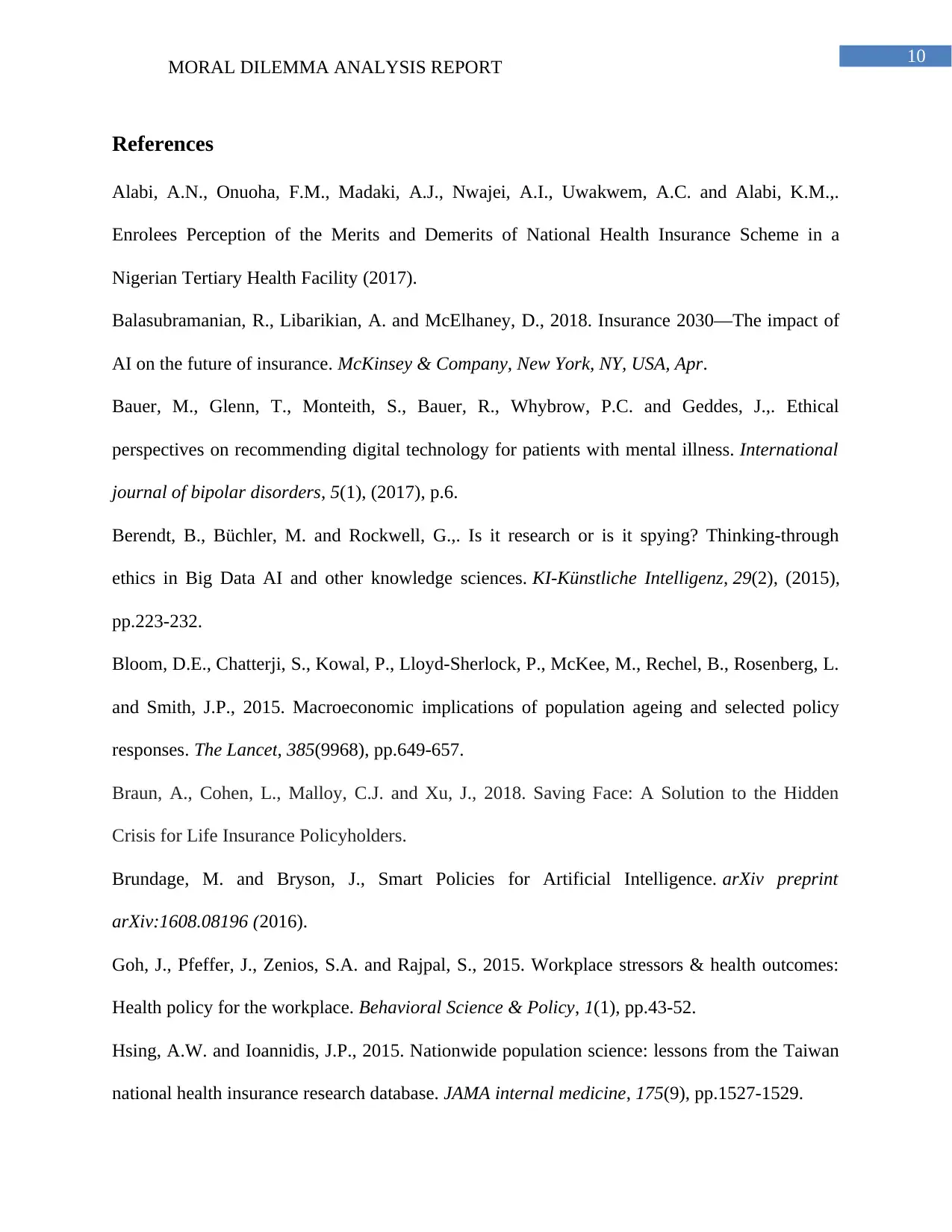
10
MORAL DILEMMA ANALYSIS REPORT
References
Alabi, A.N., Onuoha, F.M., Madaki, A.J., Nwajei, A.I., Uwakwem, A.C. and Alabi, K.M.,.
Enrolees Perception of the Merits and Demerits of National Health Insurance Scheme in a
Nigerian Tertiary Health Facility (2017).
Balasubramanian, R., Libarikian, A. and McElhaney, D., 2018. Insurance 2030—The impact of
AI on the future of insurance. McKinsey & Company, New York, NY, USA, Apr.
Bauer, M., Glenn, T., Monteith, S., Bauer, R., Whybrow, P.C. and Geddes, J.,. Ethical
perspectives on recommending digital technology for patients with mental illness. International
journal of bipolar disorders, 5(1), (2017), p.6.
Berendt, B., Büchler, M. and Rockwell, G.,. Is it research or is it spying? Thinking-through
ethics in Big Data AI and other knowledge sciences. KI-Künstliche Intelligenz, 29(2), (2015),
pp.223-232.
Bloom, D.E., Chatterji, S., Kowal, P., Lloyd-Sherlock, P., McKee, M., Rechel, B., Rosenberg, L.
and Smith, J.P., 2015. Macroeconomic implications of population ageing and selected policy
responses. The Lancet, 385(9968), pp.649-657.
Braun, A., Cohen, L., Malloy, C.J. and Xu, J., 2018. Saving Face: A Solution to the Hidden
Crisis for Life Insurance Policyholders.
Brundage, M. and Bryson, J., Smart Policies for Artificial Intelligence. arXiv preprint
arXiv:1608.08196 (2016).
Goh, J., Pfeffer, J., Zenios, S.A. and Rajpal, S., 2015. Workplace stressors & health outcomes:
Health policy for the workplace. Behavioral Science & Policy, 1(1), pp.43-52.
Hsing, A.W. and Ioannidis, J.P., 2015. Nationwide population science: lessons from the Taiwan
national health insurance research database. JAMA internal medicine, 175(9), pp.1527-1529.
MORAL DILEMMA ANALYSIS REPORT
References
Alabi, A.N., Onuoha, F.M., Madaki, A.J., Nwajei, A.I., Uwakwem, A.C. and Alabi, K.M.,.
Enrolees Perception of the Merits and Demerits of National Health Insurance Scheme in a
Nigerian Tertiary Health Facility (2017).
Balasubramanian, R., Libarikian, A. and McElhaney, D., 2018. Insurance 2030—The impact of
AI on the future of insurance. McKinsey & Company, New York, NY, USA, Apr.
Bauer, M., Glenn, T., Monteith, S., Bauer, R., Whybrow, P.C. and Geddes, J.,. Ethical
perspectives on recommending digital technology for patients with mental illness. International
journal of bipolar disorders, 5(1), (2017), p.6.
Berendt, B., Büchler, M. and Rockwell, G.,. Is it research or is it spying? Thinking-through
ethics in Big Data AI and other knowledge sciences. KI-Künstliche Intelligenz, 29(2), (2015),
pp.223-232.
Bloom, D.E., Chatterji, S., Kowal, P., Lloyd-Sherlock, P., McKee, M., Rechel, B., Rosenberg, L.
and Smith, J.P., 2015. Macroeconomic implications of population ageing and selected policy
responses. The Lancet, 385(9968), pp.649-657.
Braun, A., Cohen, L., Malloy, C.J. and Xu, J., 2018. Saving Face: A Solution to the Hidden
Crisis for Life Insurance Policyholders.
Brundage, M. and Bryson, J., Smart Policies for Artificial Intelligence. arXiv preprint
arXiv:1608.08196 (2016).
Goh, J., Pfeffer, J., Zenios, S.A. and Rajpal, S., 2015. Workplace stressors & health outcomes:
Health policy for the workplace. Behavioral Science & Policy, 1(1), pp.43-52.
Hsing, A.W. and Ioannidis, J.P., 2015. Nationwide population science: lessons from the Taiwan
national health insurance research database. JAMA internal medicine, 175(9), pp.1527-1529.
Secure Best Marks with AI Grader
Need help grading? Try our AI Grader for instant feedback on your assignments.
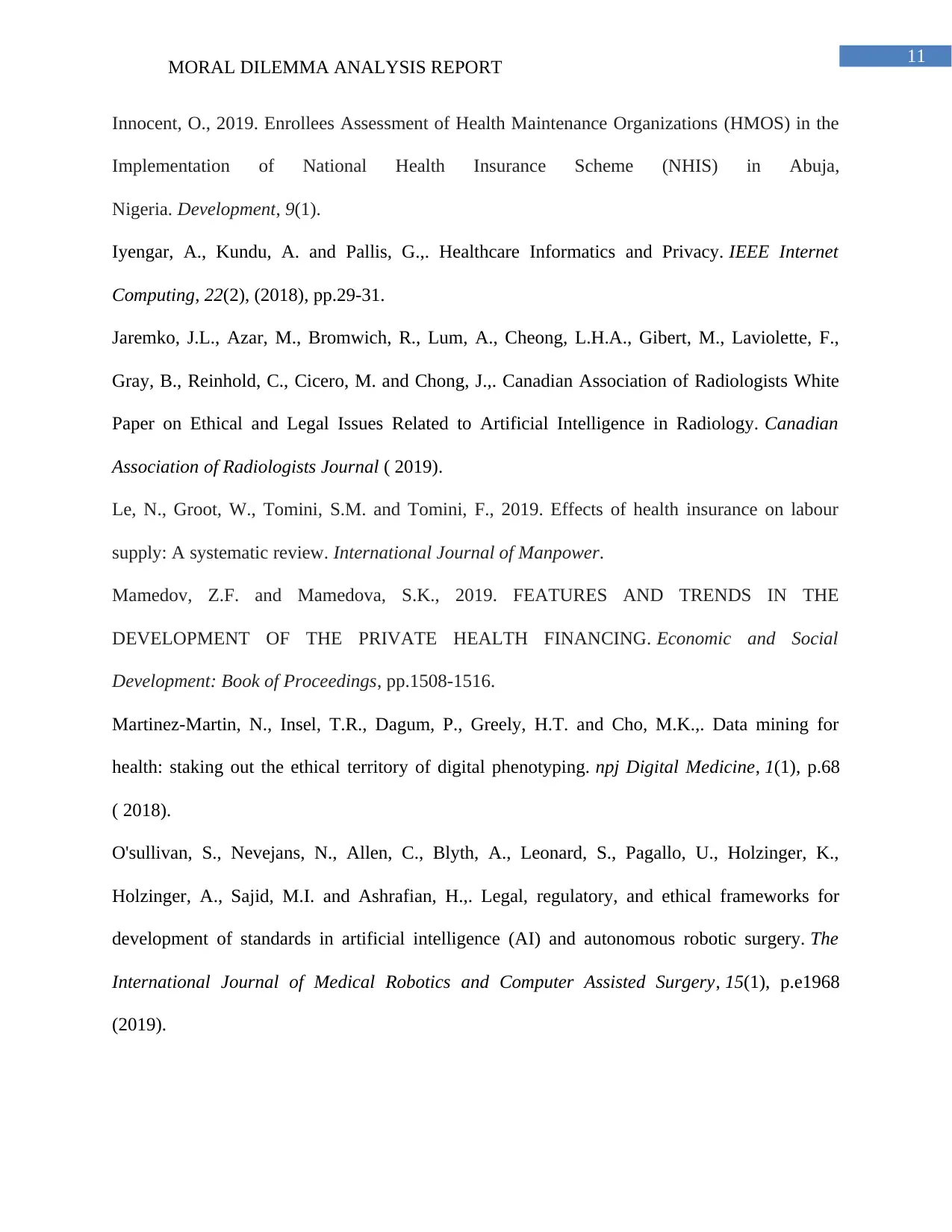
11
MORAL DILEMMA ANALYSIS REPORT
Innocent, O., 2019. Enrollees Assessment of Health Maintenance Organizations (HMOS) in the
Implementation of National Health Insurance Scheme (NHIS) in Abuja,
Nigeria. Development, 9(1).
Iyengar, A., Kundu, A. and Pallis, G.,. Healthcare Informatics and Privacy. IEEE Internet
Computing, 22(2), (2018), pp.29-31.
Jaremko, J.L., Azar, M., Bromwich, R., Lum, A., Cheong, L.H.A., Gibert, M., Laviolette, F.,
Gray, B., Reinhold, C., Cicero, M. and Chong, J.,. Canadian Association of Radiologists White
Paper on Ethical and Legal Issues Related to Artificial Intelligence in Radiology. Canadian
Association of Radiologists Journal ( 2019).
Le, N., Groot, W., Tomini, S.M. and Tomini, F., 2019. Effects of health insurance on labour
supply: A systematic review. International Journal of Manpower.
Mamedov, Z.F. and Mamedova, S.K., 2019. FEATURES AND TRENDS IN THE
DEVELOPMENT OF THE PRIVATE HEALTH FINANCING. Economic and Social
Development: Book of Proceedings, pp.1508-1516.
Martinez-Martin, N., Insel, T.R., Dagum, P., Greely, H.T. and Cho, M.K.,. Data mining for
health: staking out the ethical territory of digital phenotyping. npj Digital Medicine, 1(1), p.68
( 2018).
O'sullivan, S., Nevejans, N., Allen, C., Blyth, A., Leonard, S., Pagallo, U., Holzinger, K.,
Holzinger, A., Sajid, M.I. and Ashrafian, H.,. Legal, regulatory, and ethical frameworks for
development of standards in artificial intelligence (AI) and autonomous robotic surgery. The
International Journal of Medical Robotics and Computer Assisted Surgery, 15(1), p.e1968
(2019).
MORAL DILEMMA ANALYSIS REPORT
Innocent, O., 2019. Enrollees Assessment of Health Maintenance Organizations (HMOS) in the
Implementation of National Health Insurance Scheme (NHIS) in Abuja,
Nigeria. Development, 9(1).
Iyengar, A., Kundu, A. and Pallis, G.,. Healthcare Informatics and Privacy. IEEE Internet
Computing, 22(2), (2018), pp.29-31.
Jaremko, J.L., Azar, M., Bromwich, R., Lum, A., Cheong, L.H.A., Gibert, M., Laviolette, F.,
Gray, B., Reinhold, C., Cicero, M. and Chong, J.,. Canadian Association of Radiologists White
Paper on Ethical and Legal Issues Related to Artificial Intelligence in Radiology. Canadian
Association of Radiologists Journal ( 2019).
Le, N., Groot, W., Tomini, S.M. and Tomini, F., 2019. Effects of health insurance on labour
supply: A systematic review. International Journal of Manpower.
Mamedov, Z.F. and Mamedova, S.K., 2019. FEATURES AND TRENDS IN THE
DEVELOPMENT OF THE PRIVATE HEALTH FINANCING. Economic and Social
Development: Book of Proceedings, pp.1508-1516.
Martinez-Martin, N., Insel, T.R., Dagum, P., Greely, H.T. and Cho, M.K.,. Data mining for
health: staking out the ethical territory of digital phenotyping. npj Digital Medicine, 1(1), p.68
( 2018).
O'sullivan, S., Nevejans, N., Allen, C., Blyth, A., Leonard, S., Pagallo, U., Holzinger, K.,
Holzinger, A., Sajid, M.I. and Ashrafian, H.,. Legal, regulatory, and ethical frameworks for
development of standards in artificial intelligence (AI) and autonomous robotic surgery. The
International Journal of Medical Robotics and Computer Assisted Surgery, 15(1), p.e1968
(2019).
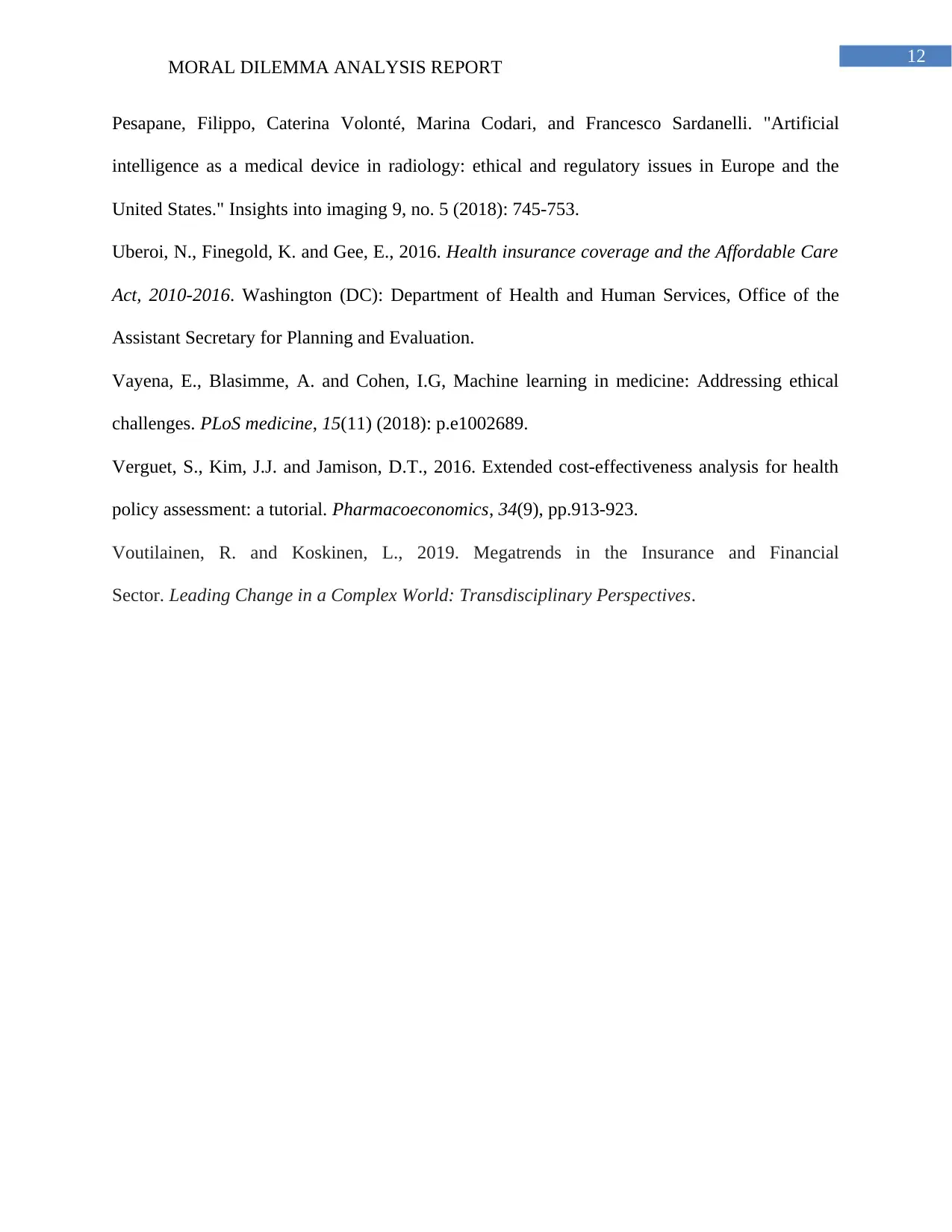
12
MORAL DILEMMA ANALYSIS REPORT
Pesapane, Filippo, Caterina Volonté, Marina Codari, and Francesco Sardanelli. "Artificial
intelligence as a medical device in radiology: ethical and regulatory issues in Europe and the
United States." Insights into imaging 9, no. 5 (2018): 745-753.
Uberoi, N., Finegold, K. and Gee, E., 2016. Health insurance coverage and the Affordable Care
Act, 2010-2016. Washington (DC): Department of Health and Human Services, Office of the
Assistant Secretary for Planning and Evaluation.
Vayena, E., Blasimme, A. and Cohen, I.G, Machine learning in medicine: Addressing ethical
challenges. PLoS medicine, 15(11) (2018): p.e1002689.
Verguet, S., Kim, J.J. and Jamison, D.T., 2016. Extended cost-effectiveness analysis for health
policy assessment: a tutorial. Pharmacoeconomics, 34(9), pp.913-923.
Voutilainen, R. and Koskinen, L., 2019. Megatrends in the Insurance and Financial
Sector. Leading Change in a Complex World: Transdisciplinary Perspectives.
MORAL DILEMMA ANALYSIS REPORT
Pesapane, Filippo, Caterina Volonté, Marina Codari, and Francesco Sardanelli. "Artificial
intelligence as a medical device in radiology: ethical and regulatory issues in Europe and the
United States." Insights into imaging 9, no. 5 (2018): 745-753.
Uberoi, N., Finegold, K. and Gee, E., 2016. Health insurance coverage and the Affordable Care
Act, 2010-2016. Washington (DC): Department of Health and Human Services, Office of the
Assistant Secretary for Planning and Evaluation.
Vayena, E., Blasimme, A. and Cohen, I.G, Machine learning in medicine: Addressing ethical
challenges. PLoS medicine, 15(11) (2018): p.e1002689.
Verguet, S., Kim, J.J. and Jamison, D.T., 2016. Extended cost-effectiveness analysis for health
policy assessment: a tutorial. Pharmacoeconomics, 34(9), pp.913-923.
Voutilainen, R. and Koskinen, L., 2019. Megatrends in the Insurance and Financial
Sector. Leading Change in a Complex World: Transdisciplinary Perspectives.
1 out of 12
Related Documents
Your All-in-One AI-Powered Toolkit for Academic Success.
+13062052269
info@desklib.com
Available 24*7 on WhatsApp / Email
![[object Object]](/_next/static/media/star-bottom.7253800d.svg)
Unlock your academic potential
© 2024 | Zucol Services PVT LTD | All rights reserved.





